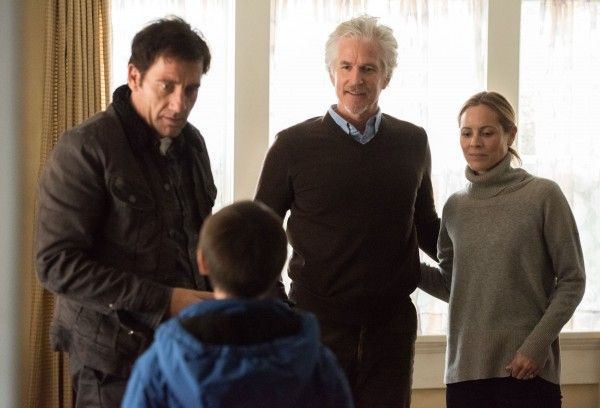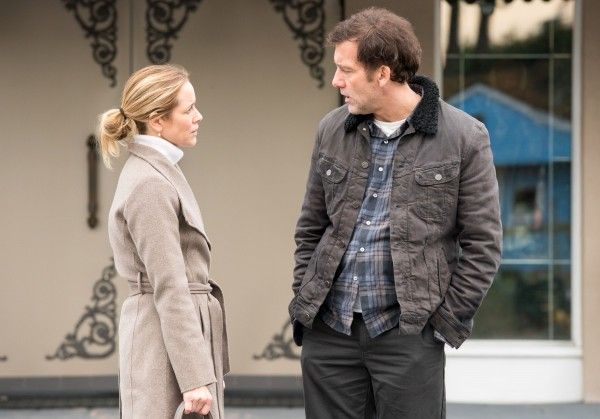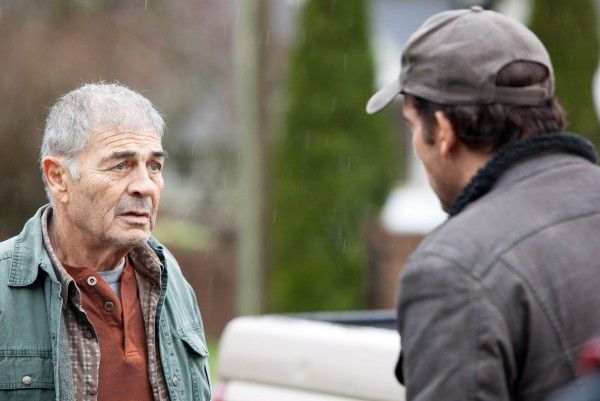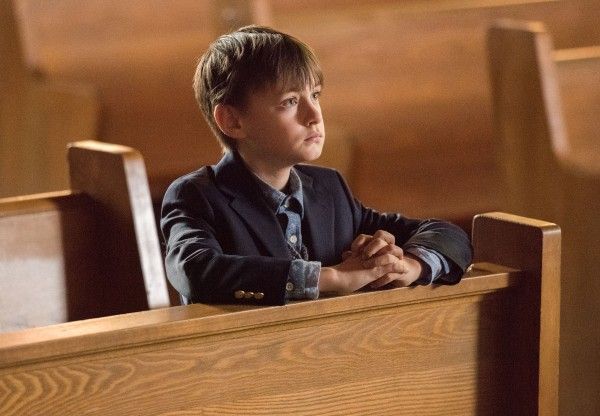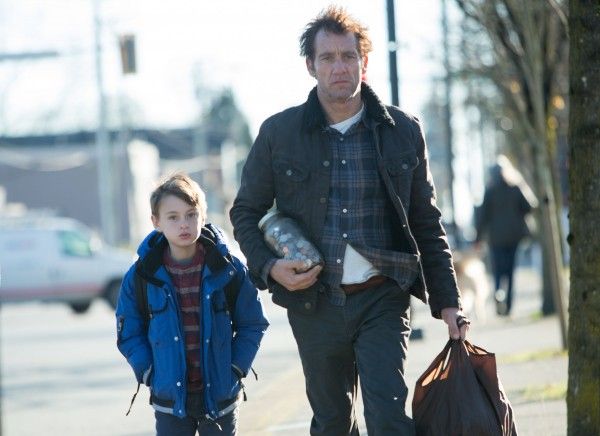From writer/director Bob Nelson, The Confirmation follows Walt (Clive Owen), a down-on-his luck carpenter who’s tasked with entertaining his eight-year-old son Anthony (Jaeden Lieberher) while Anthony’s mom (Maria Bello) and her new husband (Matthew Modine) are away. But when Walt’s prized toolbox is stolen, a previously quiet and uneventful father-and-son weekend turns into an adventure of a lifetime, as the two go on a search for the thief responsible and find some common ground through their family connection.
At the film’s press day, writer/director Bob Nelson and actor Clive Owen sat down with Collider for this exclusive interview about layering the themes of the film, how well-honed the script was, why this is a relevant story to be telling, show respect while not being judgmental of the characters, balancing the darker elements with humor, putting this cast together, and the challenge of finding the perfect young actor to center the story around. Nelson also talked about Highston, the TV show he’s doing for Amazon Prime, and the script he wrote about a Native American high school girls’ softball team, while Owen talked about that crazy season finale of his Cinemax TV series The Knick. Be aware that there are some spoilers.
Collider: This film seems so simple, and yet the layers keep peeling away and it keeps getting more complex. Bob, is that what you were attempting to do as you wrote it?
BOB NELSON: When I’m writing, I do like to deal with several themes, at the same time. There’s always a major theme, but I like to layer it, so that, as you’re watching it, it feels like it’s not just one thing. It gets inside you more, if you’re dealing with a layered structure. Technically, in the writing process, that is always in my mind.
Clive, did it come across that way, when you read the script?
CLIVE OWEN: The thing that struck me is just how well-honed it was. I’m one of those actors where usually I’ll read a script, and then I’ll have a flurry of notes. I’ll ask a hundred questions about things, and really get in there and examine it. And I really did need to do that with this. Somebody had already been really, really rigorous with it. I felt it was very delicate. The thing I was most impressed by was that there was a very warm feeling. There was a real warmth in humanity about the whole piece. All these characters in their situations, who were struggling with a lot, were not being judged or condescended. There was great empathy about it, but it never was sentimental. It always had great restraint, and I believed the relationship. I believe that we live in a time of fractured families where maybe fathers aren’t getting enough time to see their kids because life’s complications and hardships get in the way of those things. It felt, to me, a very relevant story to be telling.
It seems like it would be difficult for this guy to have a hand in guiding somebody else when he doesn’t know where he is, in his own life.
OWEN: It’s true, but there are a lot of people who go through a lot of tough things, and it doesn’t stop them from wanting to be a better parent.
Bob, was it intentional on your part to make sure that there really was no judgment of any of these characters and the decisions they were making, as a result of the situation that they’re in?
NELSON: It was important to me that, no matter who the character is and how big their role, that each person in the story is a human being and deserves respect. Even if they’re in the story for ten seconds, I didn’t want you to just see them as this entity passing through that’s serving all of the other people. That’s why I put the little talk in there that he has with the boy about, “When you’re going over a bridge, think about the people who built it.” I think about that with my stories, as well. These people aren’t just background or passing through, just for our heroes. If I can, I’ll even give them a little bit of a story themselves, inside of the bigger story. It’s important to me that everyone is treated with respect. That’s one of the big themes of the movie for me. It’s about not only forgiveness, but understanding. One of my favorite books and films, of all time, is To Kill A Mockingbird, and that’s stated in there. It’s cliche now, but it’s about trying to stand in another man’s shoes, and that’s what this movie is about. The son is experiencing what his dad is like, and he’s also seeing these other people. In a way, that dad is also seeing himself in his son’s shoes, and the boy he used to be with the innocence he had before things went awry, and it’s a place he’d maybe like to get back to.
There is a balance in this story between the dark moments and the humor. Did you feel like you could go darker, if you kept the humorous elements in there?
NELSON: I started out as a comedy writer, so it’s hard for me not to put comedy in there. But my favorite thing was To Kill A Mockingbird, so I started out on big dramas. As a kid, I always loved The Grapes of Wrath. So, I’m trying to combine the two. There are some great examples of that, through film history, to help me. I was a big Billy Wilder fan, and he could combine drama and comedy. And Hal Ashby, in the ‘70s, was someone that I really admired, at the time. And then, Alexander Payne came along, before I even knew him, and did the films Election and Citizen Ruth, where there’s humor, pathos and tragedy, all mixed in together. I think they’re harder to do than a straight comedy or straight drama, but I like attempting to do it because it’s a challenge. You have to try to figure out how long you can wait before you have another little laugh. I also looked at how Alexander Payne put Nebraska together, too, because there’s some absurdist humor there, but also some deep family tragedy going on. It’s a balancing act, and filmmakers don’t always get it right, but I like trying. It’s a real challenge, but the reason I like it is that it reflects real life to me. There’s tragedy and joy co-mingled in our lives. To try to capture that in a story is, to me, what I’m trying for.
Clive, what’s it like to play those moments, as an actor?
OWEN: I’m really lucky because the script was in such good shape. The rhythm of that does an awful lot for you. The film is peopled with really great actors. People obviously responded to the material and to the fully-fledged characters. Even if they don’t have the same amount of screen time, you do get a sense of a life in these characters, and that’s fulfilling to play. When you bring in people like Patton Oswalt into the story, it’s buoyant, fun and light. We’re often seeing what a crazy, fun character it is through Jaeden’s eyes. But, the pitching of the humor and the more serious stuff is really supported by the good writing.
Because so much of this movie relies on the audience wanting to go along with this kid, were you worried about finding someone to fill that role?
OWEN: The first conversation we had, we both knew it was about finding a great kid, and we were blessed. You won’t find a better young actor than Jaeden Lieberher. I ended up having one of the best times with him, really. Going to work with him every day was a treat. He’s uncanny because he’s the full, finished deal already. It’s conscious, what he’s doing. He’s got great instincts, but he’s a knowing performer. He’s skillful. But he’s learned something that actors tend to take a long time to learn, which is this great restraint. He’s not excitable. He doesn’t over commit to things. He trusts the material and can sit on who he is, and I love that kind of acting. I responded really strongly to it and loved working with him. He’s my kind of actor already.
NELSON: I think I actually lost sleep, thinking about trying to cast the boy. I was so worried. I thought I’d have to do a worldwide search. But fortunately, the director of St. Vincent did it for me. I saw an interview that he’d looked at over 2,000 boys for that role. And then, I heard that Cameron Crowe (Aloha) had cast him in his movie, and that he was going to be in this other big movie, Midnight Special. But when we brought him to the audition room, I saw what a great kid he is. I told the casting director, “I know we can keep looking, and I thought I would have to for months, but he seems perfect. I can’t find a reason not to see if we can get him on this film, right now.” And she agreed with me.
You have such a great group of actors in this film. Did you write this thinking of any of them, or did you write it first and worry about that later?
NELSON: I wrote it, and then I worried. And I worried, a lot. For one thing, this movie came together at the last minute. I had to rush up to the prep offices, and at that time, we had Clive and Jaeden, and we had five weeks before we started shooting. I’m a big fan of comedies and dramas, and I watch tons of movies. With that little time left, what I had to resort to was just to go after people that I had loved, over the years, and see if I could get them. So, I went after Robert Forster. It’s not a huge role, but he’s one of my favorite actors. The guy is great, and then I read great things about him and how he likes to work. People don’t know Stephen Tobolowsky’s name, but he’s been in so many things and he’s so good. He’s been around forever and he’s such a professional. He’s in the film for a few minutes as the priest, but he went and interviewed two priests for the role. I was looking for people like that. I do research on people. I even researched Clive. I loved him, as an actor, over the years. There was one thing he did for Ricky Gervais in Extras that I thought was just fantastic. He seemed like a great guy to be working with, but I read a lot of his interviews online, and read about how he approached acting and how professional he is, and that was important to me, especially as a first-time director. I did that with every actor. Before I would send the script to them, I would read about them and see if they were going to be a problem or not. That helped us a lot. We had 22 days to shoot this film, and all of that is important. I saw Patton Oswalt play a dramatic role in Big Fan and in Young Adult, and that’s why I went after him. I knew he could do the comedy, but I’d seen him do these beautiful, sad people in these other films, and knew that would work well for this character.
What was the collaboration between you guys like, on set? Were you already on the same page with what you wanted to do, by then?
OWEN: Personally, I’m not a great lover of having those conversations on a set. I think they’re good to have before you get there, so that you know. We spent a good few days, mainly just be, Bob and Jaeden, talking through every single scene. On the budget we had and with the time scale we had, we needed to have those discussions. You can’t be holding the crew up, discussing the intent of the scene. So, we’d done a lot of that. But, you’re in a very good place when the script is in such good place. It wasn’t like we needed to really wrestle with the material and shape it up. It was already incredibly well-honed. I’m a little anal with notes, when I’m reading a script. I flood it with little questions and details, and I had very little on this. I knew, going in, the fact that it was such a short shoot with a low budget wouldn’t matter with this because the material was in such great shape.
Bob, do you know what you’re going to be doing next? Do you have any projects close to production?
NELSON: I have a TV show for Amazon Prime, called Highston. We did a pilot and now it’s going to go to series, so I’m writing the next few episodes of that. I took a break from the studio assignments and I wrote a bunch of scripts, so I have five scripts. [The Confirmation] is the first one that I really took out and got financing for. I want to get back to those. I have to do the TV show first, but the next one that I’m hoping to get going is about a Native American high school girls’ softball team. A friend of mine went through an experience, where it was the first year of their school and a lot of the girls had never played softball before. He told me about his experience. They asked him to come in, coach them, get them in a league and start playing softball, and he had all of these interesting experiences with them. So, I wrote that up and that’s one that’s in the pipeline. It’s hard to get financing for these movies, but I’m always going to keep trying.
Clive, as a huge fan of The Knick, I have to say that you had one of the best and most memorable season finales. Operating on yourself has got to go down as one of the craziest things to happen on a TV show, ever. Is there any chance of Dr. Thackery coming back?
OWEN: No. I’d always signed on for a two-year thing. It was always a two-year arc of the story, and I knew that’s where it would go. I had the best time, and that was a way to go.
The Confirmation is now in theaters.


